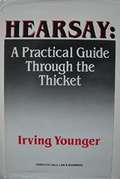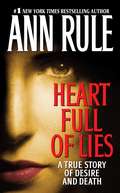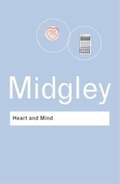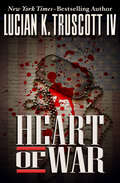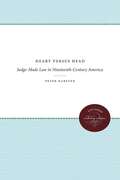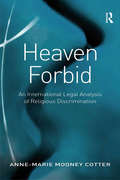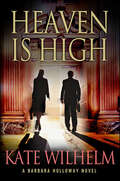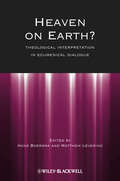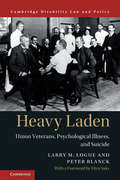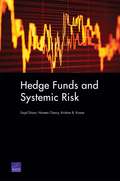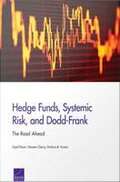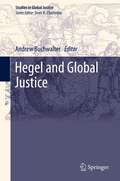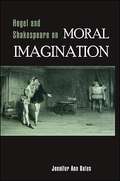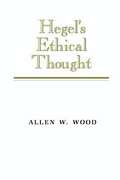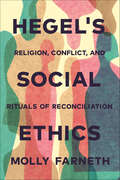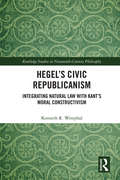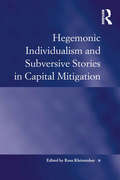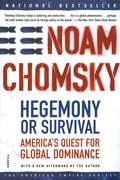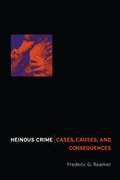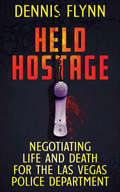- Table View
- List View
Hear No Evil
by Sarah Smith'Beautifully written and a real page turner -a wonderful insight into the early quest to understand and give a voice to people who cannot hear. ' Elisabeth Gifford 'A fascinating exploration of deafness and human value amid the sights, sounds of smells of 1817 urban Scotland.' Sally Magnusson 'told with great empathy and heart' Guinevere Glasfurd'A striking and stylish literary page-turner that breathes life into the past' Zoë StrachanIn the burgeoning industrial city of Glasgow in 1817 Jean Campbell - a young, Deaf woman - is witnessed throwing a child into the River Clyde from the Old Bridge.No evidence is yielded from the river. Unable to communicate with their silent prisoner, the authorities move Jean to the decaying Edinburgh Tolbooth in order to prise the story from her. The High Court calls in Robert Kinniburgh, a talented teacher from the Deaf & Dumb Institution, in the hope that he will interpret for them and determine if Jean is fit for trial. If found guilty she faces one of two fates; death by hanging or incarceration in an insane asylum.Through a process of trial and error, Robert and Jean manage to find a rudimentary way of communicating with each other. As Robert gains her trust, Jean confides in him, and Robert begins to uncover the truth, moving uneasily from interpreter to investigator, determined to clear her name before it is too late.Based on a landmark case in Scottish legal history Hear No Evil is a richly atmospheric exploration of nineteenth-century Edinburgh and Glasgow at a time when progress was only on the horizon. A time that for some who were silenced could mean paying the greatest price.
Hear No Evil
by Sarah SmithIn the burgeoning industrial city of Glasgow in 1817 Jean Campbell - a young, Deaf woman - is witnessed throwing a child into the River Clyde from the Old Bridge.No evidence is yielded from the river. Unable to communicate with their silent prisoner, the authorities move Jean to the decaying Edinburgh Tolbooth in order to prise the story from her. The High Court calls in Robert Kinniburgh, a talented teacher from the Deaf & Dumb Institution, in the hope that he will interpret for them and determine if Jean is fit for trial. If found guilty she faces one of two fates; death by hanging or incarceration in an insane asylum.Through a process of trial and error, Robert and Jean manage to find a rudimentary way of communicating with each other. As Robert gains her trust, Jean confides in him, and Robert begins to uncover the truth, moving uneasily from interpreter to investigator, determined to clear her name before it is too late.Based on a landmark case in Scottish legal history Hear No Evil is a richly atmospheric exploration of nineteenth-century Edinburgh and Glasgow at a time when progress was only on the horizon. A time that for some who were silenced could mean paying the greatest price. 'Beautifully written and a real page turner -a wonderful insight into the early quest to understand and give a voice to people who cannot hear. ' Elisabeth Gifford 'A fascinating exploration of deafness and human value amid the sights, sounds of smells of 1817 urban Scotland.' Sally Magnusson'A striking and stylish literary page-turner that breathes life into the past' Zoë Strachan(P) 2022 Hodder & Stoughton Limited
Hearsay: A Practical Guide Through the Thicket
by Irving YoungerHearsay: A Practical Guide Through the Thicket by Irving Younger.
Heart Full of Lies: A True Story of Desire and Death
by Ann RuleFrom #1 New York Times bestselling true-crime author Ann Rule comes &“a convincing portrait of a meticulous criminal mind&” (The Washington Post) in this chilling tale about a beautiful and charming widow with a dark side. An idyllic Hawaiian wedding held the promise of a wonderful future for handsome, athletic Chris Northon, an airline pilot, a confirmed bachelor-turned-devoted family man; and Liysa, an acclaimed surf photographer, loving mother, and aspiring Hollywood screenwriter. But few, including Chris, had seen Liysa's other side—her controlling behavior and dark moods, her insatiable hunger for money and property. And no one anticipated the fatal outcome of a family camping trip in an Oregon forest. Liysa soon revealed herself as a victim of domestic abuse that culminated at the campsite, where she shot Chris in self-defense. But crime scene evidence led detectives to wonder if Liysa was a killer, not a victim. Her controversial trial stunned all who thought they knew her. A lifetime of sociopathic manipulations and lies had been expertly hidden behind her façade of perfection—as was her rage to destroy any obstacle to her ultimate happiness, even if it was the man she vowed to love forever.
Heart and Mind
by Mary MidgleyThroughout our lives we are making moral choices. Some decisions simply direct our everyday comings and goings; others affect our individual destinies. How do we make those choices? Where does our sense of right and wrong come from, and how can we make more informed decisions?
Heart of War
by Lucian K. Truscott IV&“Sex, sexism, and murder rear their ugly heads at an Army base . . . another engrossing, cautionary tale from Truscott . . . A well-handled shocker&” (Kirkus Reviews). The brutal murder of Lieutenant Sheila Worthy has sent shock waves of fear throughout Fort Benning, Georgia; the task of finding her killer falls to Major Kara Guidry, the top lawyer in the judge advocate general&’s office. Kara must tread carefully; suspicion of guilt has already begun to spread—all the way to Washington&’s corridors of power. But the most dangerous revelation of all is yet to come. It is a secret that will rock the military establishment. A secret Kara must protect at all costs—before a shattering courtroom disclosure blows the truth sky-high . . .
Heart versus Head: Judge-Made Law in Nineteenth-Century America (Studies in Legal History)
by Peter KarstenChallenging traditional accounts of the development of American private law, Peter Karsten offers an important new perspective on the making of the rules of common law and equity in nineteenth-century courts. The central story of that era, he finds, was a struggle between a jurisprudence of the head, which adhered strongly to English precedent, and a jurisprudence of the heart, a humane concern for the rights of parties rendered weak by inequitable rules and a willingness to create exceptions or altogether new rules on their behalf. Karsten first documents the tendency of jurists, particularly those in the Northeast, to resist arguments to alter rules of property, contract, and tort law. He then contrasts this tendency with a number of judicial innovations--among them the sanctioning of 'deep pocket' jury awards and the creation of the attractive-nuisance rule--designed to protect society's weaker members. In tracing the emergence of a pro-plaintiff, humanitarian jurisprudence of the heart, Karsten necessarily addresses the shortcomings of the reigning, economic-oriented paradigm regarding judicial rulemaking in nineteenth-century America.Originally published in 1997.A UNC Press Enduring Edition -- UNC Press Enduring Editions use the latest in digital technology to make available again books from our distinguished backlist that were previously out of print. These editions are published unaltered from the original, and are presented in affordable paperback formats, bringing readers both historical and cultural value.
Heaven Forbid: An International Legal Analysis of Religious Discrimination
by Anne-Marie Mooney CotterAs the population becomes more diverse internationally, Religious Discrimination has become increasingly important as an area of law around the world. Heaven Forbid allows readers a better understanding of the issue of religion and inequality and aims to increase the likelihood of achieving equality at both national and international levels for those suffering religious discrimination. Discussing the two most important trade agreements of our day - namely the North American Free Trade Agreement and the European Union Treaty - in a historical and compelling analysis of discrimination, Heaven Forbid provides a detailed examination of the relationship between religious issues and the law, and will be an important read for all those concerned with equality.
Heaven is High (A Barbara Holloway Novel)
by Kate WilhelmBarbara Holloway is a low-key attorney in Eugene, Oregon who left her father's high powered firm to handle small legal problems for local residents and ponder her own next move. But while trying to sort out her own future, two people, desperate for help, show up on her doorstep: former pro football player Martin Owens and his wife Binnie. Binnie, who is mute, met her husband when she snuck aboard his boat while it was docked in Haiti and smuggled herself into the U. S. Now Immigration is seeking to deport her back to Haiti, which would be a death sentence. Born to a woman from Belize who was kidnapped and enslaved by pirates, Binnie's only hope is to prove her and her mother's real identity. With only days to find the truth and protect Binnie, Holloway sets off for Belize. But what she knows is only the tip of the iceberg in what turns out to be one of her most complex, compelling and dangerous cases yet.
Heaven on Earth
by Hans Boersma Matthew LeveringThis collection assembles essays by eleven leading Catholic and evangelical theologians in an ecumenical discussion of the benefits - and potential drawbacks - of today's burgeoning corpus of theological interpretation. The authors explore the critical relationship between the earthly world and its heavenly counterpart.Ground-breaking volume of ecumenical debate featuring Catholic and evangelical theologiansExplores the core theological issue of how the material and spiritual worlds interrelateFeatures a diversity of analytical approachesAddresses an urgent need to distinguish the positive and problematic aspects of today's rapidly growing corpus of theological interpretation
Heavy Laden: Union Veterans, Psychological Illness, and Suicide (Cambridge Disability Law and Policy Series)
by Peter Blanck Larry M. LogueThe psychological aftereffects of war are not just a modern-day plight. Following the Civil War, numerous soldiers returned with damaged bodies or damaged minds. Drawing on archival materials including digitized records for more than 70,000 white and African-American Union army recruits, newspaper reports, and census returns, Larry M. Logue and Peter Blanck uncover the diversity and severity of Civil War veterans' psychological distress. Their findings concerning the recognition of veterans' post-traumatic stress disorders, treatment programs, and suicide rates will inform current studies on how to effectively cope with this enduring disability in former soldiers. This compelling book brings to light the continued sacrifices of men who went to war.
Hedge Fund Activism in Japan
by John Buchanan Dominic Heesang Chai Simon DeakinHedge fund activism is an expression of shareholder primacy, an idea that has come to dominate discussion of corporate governance theory and practice worldwide over the past two decades. This book provides a thorough examination of public and often confrontational hedge fund activism in Japan in the period between 2001 and the full onset of the global financial crisis in 2008. In Japan this shareholder-centric conception of the company espoused by activist hedge funds clashed with the alternative Japanese conception of the company as an enduring organisation or a 'community'. By analysing this clash, the book derives a fresh view of the practices underpinning corporate governance in Japan and offers suggestions regarding the validity of the shareholder primacy ideas currently at the heart of US and UK beliefs about the purpose of the firm.
Hedge Funds and Systemic Risk
by Noreen Clancy Lloyd Dixon Krishna B. KumarThis report explores the extent to which hedge funds create or contribute to systemic risk, the role they played in the financial crisis, and whether and how the Dodd-Frank Wall Street Reform and ConsumerProtection Act of 2010 addresses the potential systemic risks posed by hedge funds.
Hedge Funds, Systemic Risk, and Dodd-Frank: The Road Ahead
by Noreen Clancy Lloyd Dixon Krishna B. KumarThese proceedings summarize the key themes and issues raised during a symposium on September 24, 2012, hosted by the RAND Center for Corporate Ethics and Governance. Discussion focused on the ways in which hedge funds might contribute to systemic risk and the extent to which recent financial reforms address these potential risks. Participants included thought leaders from industry, government, and academia.
Hegel and Global Justice
by Andrew BuchwalterHegel and Global Justice details the relevance of the thought of G.W.F. Hegel for the burgeoning academic discussions of the topic of global justice. Against the conventional view that Hegel has little constructive to offer to these discussions, this collection, drawing on the expertise of distinguished Hegel scholars and internationally recognized political and social theorists, explicates the contribution both of Hegel himself and his "dialectical" method to the analysis and understanding of a wide range of topics associated with the concept of global justice, construed very broadly. These topics include universal human rights, cosmopolitanism, and cosmopolitan justice, transnationalism, international law, global interculturality, a global poverty, cosmopolitan citizenship, global governance, a global public sphere, a global ethos, and a global notion of collective self-identity. Attention is also accorded the value of Hegel's account of mutual recognition for analysing themes in global justice, both as regards the politics of recognition at the global level and the conditions for a general account of relations of people and persons under conditions of globalization. In exploring these and related themes, the authors of this book regularly compare Hegel to others who have contributed to the discourse on global justice, including Kant, Marx, Rawls, Habermas, Singer, Pogge, Nussbaum, Appiah, and David Miller.
Hegel and Shakespeare on Moral Imagination
by Jennifer Ann BatesIn this fascinating book, Jennifer Ann Bates examines shapes of self-consciousness and their roles in the tricky interface between reality and drama. Shakespeare's plots and characters are used to shed light on Hegelian dialectic, and Hegel's philosophical works on art and politics are used to shed light on Shakespeare's dramas. Bates focuses on moral imagination and on how interpretations of drama and history constrain it. For example: how much luck and necessity drive a character's actions? Would Coriolanus be a better example than Antigone in Hegel's account of the Kinship-State conflict? What disorients us and makes us morally stuck? The sovereign self, the moral pragmatics of wit, and the relationship between law, tragedy, and comedy are among the multifaceted considerations examined in this incisive work. Along the way, Bates traces the development of deleterious concepts such as fate, anti-Aufhebung, crime, evil, and hypocrisy, as well as helpful concepts such as wonder, judgment, forgiveness, and justice
Hegel's Ethical Thought
by Allen W. WoodThis important new study offers a powerful exposition of the ethical theory underlying Hegel's philosophy of society, politics, and history. Professor Woodshows how Hegel applies his theory to such topics as human rights, the justification of legal punishment, criteria of moral responsibility, and the authority of individual conscience. The book includes a critical discussion of Hegel's treatment of other moral philosophers (especially Kant, Fichte and Fries), provides an account of the controversial concept of 'ethical life', and shows the relation between the theory and Hegel's critical assessment of modern social institutions. The book is nontechnical and should interest anyone concerned with Hegel's ethical and political thought, including philosophers, political scientists, intellectual historians and students of German culture.
Hegel's Social Ethics: Religion, Conflict, and Rituals of Reconciliation
by Molly FarnethHegel’s Social Ethics offers a fresh and accessible interpretation of G. W. F. Hegel’s most famous book, the Phenomenology of Spirit. Drawing on important recent work on the social dimensions of Hegel’s theory of knowledge, Molly Farneth shows how his account of how we know rests on his account of how we ought to live.Farneth argues that Hegel views conflict as an unavoidable part of living together, and that his social ethics involves relationships and social practices that allow people to cope with conflict and sustain hope for reconciliation. Communities create, contest, and transform their norms through these relationships and practices, and Hegel’s model for them are often the interactions and rituals of the members of religious communities.The book’s close readings reveal the ethical implications of Hegel’s discussions of slavery, Greek tragedy, early modern culture wars, and confession and forgiveness. The book also illuminates how contemporary democratic thought and practice can benefit from Hegelian insights.Through its sustained engagement with Hegel’s ideas about conflict and reconciliation, Hegel’s Social Ethics makes an important contribution to debates about how to live well with religious and ethical disagreement.
Hegel’s Civic Republicanism: Integrating Natural Law with Kant’s Moral Constructivism (Routledge Studies in Nineteenth-Century Philosophy)
by Kenneth R. WestphalIn this book, Westphal offers an original interpretation of Hegel’s moral philosophy. Building on his previous study of the role of natural law in Hume’s and Kant’s accounts of justice, Westphal argues that Hegel developed and justified a robust form of civic republicanism. Westphal identifies, for the first time, the proper genre to which Hegel’s Philosophical Outlines of Justice belongs and to which it so prodigiously contributes, which he calls Natural Law Constructivism, an approach developed by Hume, Rousseau, Kant, and Hegel. He brings to bear Hegel’s adoption and augmentation of Kant’s Critique of rational judgment and justification in all non-formal domains to his moral philosophy in his Outlines. Westphal argues that Hegel’s justification for the standards of political legitimacy successfully integrates Rousseau’s Independence Requirement into the role of public reason within a constitutional republic. In these regards, Hegel’s moral and political principles are progressive not only in principle, but also in practice. Hegel’s Civic Republicanism will be of interest to scholars of moral philosophy, social and political philosophy, Hegel, eighteenth- and nineteenth-century philosophy.
Hegemonic Individualism and Subversive Stories in Capital Mitigation
by Ross KleinstuberCapital punishment policies in the USA are almost always justified by an individualistic belief in either rational choice or dispositional attribution, which justifies the death penalty either as a deterrent, or for retributive or incapacitative purposes. This book takes an in-depth look at the mitigation process and the use of individualism in the capital sentencing process. The work examines the use of individualistic (hegemonic) and contextualizing (subversive) discourses in the mitigation cases presented by capital defense attorneys and experts from trials in Delaware, and how these discourses were understood, interpreted, and utilized by jurors who served on those trials and by the judges who imposed the final sentences. This in-depth sociological examination of the use of individualizing and contextualizing accounts throughout the entire mitigation process helps to illuminate the challenges involved in structuring a death penalty that is not arbitrary in a culture that is overwhelmed by individualizing discourses, and thus struggles to account for the entrenched racial and economic inequality that is so conducive to lethal violence. In conclusion, it questions the entire premise of the Supreme Court’s jurisprudence of death, which rests on a belief that the discretion of decision makers can be 'guided' in a way that accounts for contextualizing evidence and will reduce the death penalty’s arbitrary and discriminatory application.
Hegemony or Survival: America's Quest for Global Dominance
by Noam ChomskyAn immediate national bestseller, Hegemony or Survival demonstrates how, for more than half a century the United States has been pursuing a grand imperial strategy with the aim of staking out the globe. Our leaders have shown themselves willing-as in the Cuban missile crisis-to follow the dream of dominance no matter how high the risks. World-renowned intellectual Noam Chomsky investigates how we came to this perilous moment and why our rulers are willing to jeopardize the future of our species. With the striking logic that is his trademark, Chomsky tracks the U.S. government's aggressive pursuit of "full spectrum dominance" and vividly lays out how the most recent manifestations of the politics of global control-from unilateralism to the dismantling of international agreements to state terrorism-cohere in a drive for hegemony that ultimately threatens our existence. Lucidly written, thoroughly documented, and featuring a new afterword by the author, Hegemony or Survival is a definitive statement from one of today's most influential thinkers.
Heidegger on Concepts, Freedom and Normativity
by Sacha GolobThis book offers a fundamentally new account of the arguments and concepts which define Heidegger's early philosophy, and locates them in relation to both contemporary analytic philosophy and the history of philosophy. Drawing on recent work in the philosophy of mind and on Heidegger's lectures on Plato and Kant, Sacha Golob argues against existing treatments of Heidegger on intentionality and suggests that Heidegger endorses a unique position with respect to conceptual and representational content; he also examines the implications of this for Heidegger's views on truth, realism and 'being'. He goes on to explore Heidegger's work on the underlying issue of normativity, and focuses on his theory of freedom, arguing that it is freedom that links the existential concerns of Being and Time to concepts such as reason, perfection and obligation. His book offers a distinctive new perspective for students of Heidegger and the history of twentieth-century philosophy.
Heinous Crime: Cases, Causes, and Consequences
by Reamer Frederic G.What circumstances lead someone to commit murder, rape, or acts of child molestation? Why does society have such a deep-seated wish for vengeance against perpetrators of heinous crimes? Can those found guilty of such crimes ever be rehabilitated? Officials of the criminal justice system, politicians, and ordinary citizens argue about possible solutions to these controversial and vital questions, with little agreement. This book offers innovative perspectives on the difficult issues concerning a civilized society's response to offenders guilty of heinous crimes.
Heinous Crime: Cases, Causes, and Consequences
by Frederic G. ReamerWhat circumstances lead someone to commit murder, rape, or acts of child molestation? Why does society have such a deep-seated wish for vengeance against perpetrators of heinous crimes? Can those found guilty of such crimes ever be rehabilitated? What are the long-term consequences of incarceration, for inmates and society? Officials of the criminal justice system, politicians, and ordinary citizens argue about possible answers to these controversial and vital questions, with little agreement. Violent crime and overflowing prisons continue to be unfortunate aspects of our society as the criminal justice system struggles to develop a coherent strategy to deal with heinous crimes. This book offers innovative perspectives on the difficult issues concerning a civilized society's response to offenders guilty of heinous crimes. It considers specific cases and the chilling accounts of victims and the criminals themselves. In providing detailed strategies for prevention and rehabilitation, Frederic G. Reamer draws on his extensive experience as a member of the Rhode Island Parole Board, where he has heard more than 13,000 cases, and as a social worker in correctional facilities. He examines the psychological and social factors that lead individuals to commit reprehensible crimes, arguing that a fuller understanding of different criminal types is crucial to developing successful answers to the problem of heinous crimes. Closely looking at various criminal typologies, Reamer examines the effectiveness and rationale of various responses, including revenge and retribution, imprisonment for public safety, rehabilitation, and restorative justice.
Held Hostage: Negotiating Life and Death for the Las Vegas Police Department
by Dennis FlynnThis &“riveting true life account&” goes inside the life-or-death world of a Las Vegas police crisis negotiator: &“a must read" (Gary W. Noesner, Chief, FBI Crisis Negotiation Unit, author of Stalling For Time). What do you say to prevent someone from committing &“suicide-by-cop&”? How do you talk someone down when he&’s pointing a gun at a hostage? What tactics do you use when lives depend on your words? Veteran police negotiator Lieutenant Dennis Flynn spent nearly two decades responding to more than a thousand high-intensity incidents with the Crisis Negotiations Team in Las Vegas, Nevada. He approached every scenario with the same goal: bring everyone out alive. This vivid memoir offers a rare, behind-the-scenes view of the life-and-death situations that police negotiators face on a daily basis. Taking readers through both exhilarating successes and tragic failures, Flynn offers a guided tour of the extreme and potentially deadly side of Sin City.


